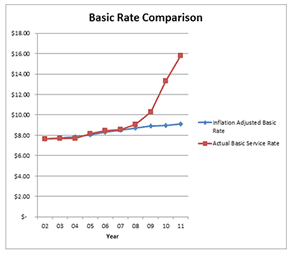
Boston is on the warpath when it comes to basic cable rates. Its mayor Thomas M. Menino is filing an "emergency" petition with the Federal Communications Commission demanding the right to regulate prices for the service in that city.
"TMM requests this action after Comcast increased their Basic Rate by 18 percent this year," Boston's Office of Cable Communications notes in a press statement. "Comcast continues to disproportionately burden working families by targeting the Basic Rate for significant increases."
Current footprints
Some background: the Telecommunications Act of 1996 provided a mechanism for deregulating local cable costs—effectively taking city governments out of the rate-setting picture if a regional environment can be classified as competitive enough to keep prices down on its own. The FCC approved the deregulation of the Boston area in 2002.

The justification in that instance was, in part, that the RCN company was running an Open Video System (OVS) for Boston. But according to Boston's documentation, RCN's 1997 license agreement required it to build out to at least 265,100 residential units by the end of 2002. The service subsequently claimed it couldn't find the capital to finance the expansion.
"RCN indicated that an OVS agreement without buildout requirements would enable the company to use its operating capital to increase its penetration rate through the wiring of new homes within its current footprint," the City says in a declaration to the FCC. But "the company's system today (2011) passes but a small fraction of that number," about 15,000 customers.
Removing the condition

This effectively left Boston with one provider: Comcast, which serves around 170,000 Bostonians. Basic Cable is the minimal and most affordable pay TV tier available to consumers—at least it is supposed to be.
According to the City, Comcast's 2011 Basic Service Rate change went from $13.30 to $15.80 a month. This came in the wake of previous rate hikes—to $9.05 in 2008, to $10.30 in 2009, and to $13.30 in 2010.
That all adds up to "more than 60%, on a service that is supposed to be affordable and is identified in the industry as ‘lifeline service'," Boston says.
"In addition, when comparing Boston to neighboring communities that have rate regulation, Comcast has over-collected approximately $24 million from Boston's Basic Subscribers during the four year period from 2008 through 2011," the City's statement claims. Its own research indicates that neighboring cities that are still regulated, such as Cambridge, have cheaper rates.
This isn't the first time that Boston has petitioned the FCC to get its Basic Cable rate authority back. The municipality asked for such powers six years ago, without success.
But Mayor Menino think that because RCN was recently purchased by ABRY Partners, a private equity firm, this "removes the condition that forced Boston's market to become unregulated"—specifically, a telephone company no longer controls RCN.
With that sale, "we feel there's an even greater argument that Boston is no longer a competitive market,'' Menino told The Boston Globe in an interview.
Comcast sent us the following statement in response to Boston's move. “Comcast faces a highly competitive environment across all its product lines, with significant video competition from numerous providers including satellite, RCN, free broadcast and other types of video options," the reply begins:
Comcast’s Basic service in Boston continues to be nearly half the cost of any other provider’s entry-level service—and no other competitor offers a comparable level of service comprised of more than 35 channels of news, information, diversity and public access programming. We believe we continue to offer the most affordable options and best values for consumers. Comcast continues to invest in the City of Boston with next-generation technology for residential customers and businesses alike, and last year alone, invested more than $4.9 million in the City of Boston through foundation grants and in-kind services.
reader comments
131